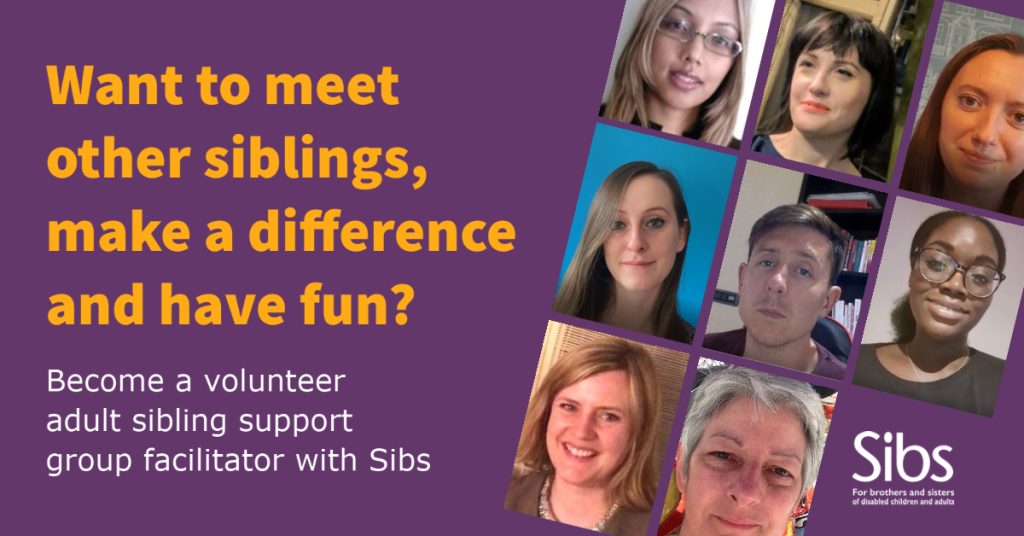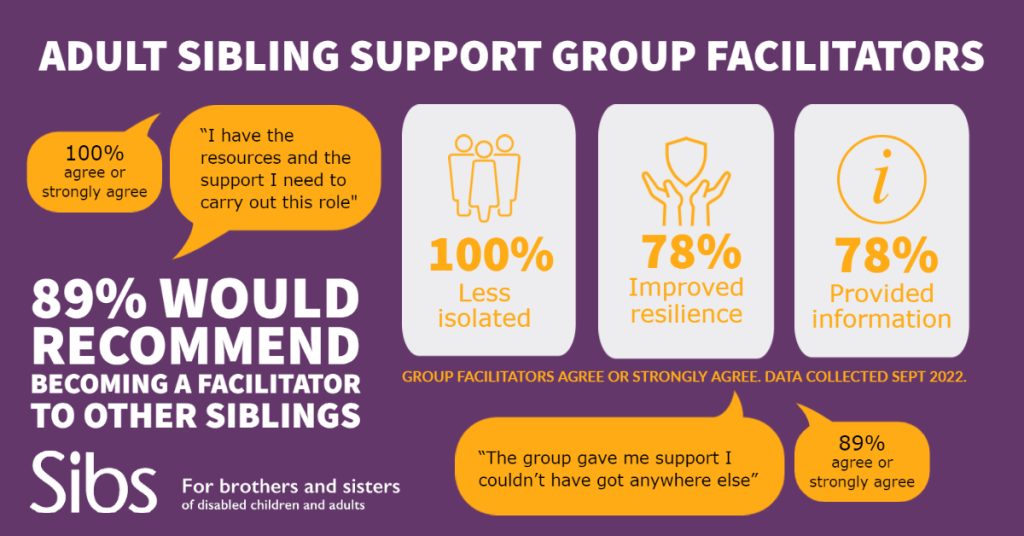Facilitate an adult sibling group in your area
Are you an adult sibling who grew up with a disabled brother or sister? Are you passionate about helping other adult siblings to meet and support each other? Read more about starting a support group here.

When is the next training session?
We’ve been fortunate to hold a training session every year since 2016. We would love to hold another one in 2024, if funding allows, however this isn’t confirmed at present. Please join our mailing list, as we’ll announce in our newsletter if and when the next training session will go ahead.
About the role
This is a voluntary role for an adult sibling group facilitator. You’ll be running online support group meetings for adults who have (or had) a brother or sister who has a lifelong disability. You’ll be managing a mailing list, planning meetings and facilitating the discussion. You’re a sibling yourself, and are very much a member of the group too. We want facilitators to receive as well as give peer support. You can read more about current groups here.
What’s the commitment?
- Attend a full-day online training session (approx. 6 hrs total)
- Weekly commitment – check group email address, respond to emails and update your mailing list, advertise the group locally (approx. 1 hr)
- Meeting commitment – hold a meeting every 4 – 8 weeks (approx. 2 hr meeting)
- Attend check-ins with Sibs (approx. 1 hr x3 a year, can be more if you’d like more support)
- Attend facilitator forum (approx. 2 hrs x4 a year)
As the training and application process is costly for Sibs, we ask that facilitators join us for a minimum of a year.
“Being a group facilitator has given me such a sense of purpose and fulfilment. Being able to connect siblings to one another and make them feel less alone has been really special. I’m so pleased that I go involved” – Hannah, National adult sibling group facilitator
Attitude
The most important qualities to have are:
- Respecting and valuing adult siblings
- Respecting and valuing disabled people
- Being inclusive of people from a wide range of backgrounds
- Believing in the positive benefits of peer support
And you must be an adult sibling of someone with a lifelong disability.
“Being a facilitator for Sibs has given me a space where I can talk about feelings and experiences and emotions that I’ve never been able to speak to anyone else to about before” – Jack, West London adult sibling group facilitator
Skills and experience
The following skills are important for facilitating a sibling discussion at a group meeting:
- Able to be reliable and consistent
- Able to manage time
- Able to encourage participation of all members
- Able to listen actively to others
- Able to manage conflict and differences of opinion
- Able to keep the group on topic
- Able to acknowledge siblings’ feelings
- Able to set your own needs to one side (at times)
- Able to delegate tasks to other group members
- Able to take action on safeguarding issues (we can support you with this)
- Able to signpost adult siblings to sources of support
You may already have most of these skills and the training day will help you use them to facilitate an adult sibling support group.
“Being a facilitator for Sibs has given me the opportunity to meet other siblings and to discuss really important topics like future planning and managing our own health and wellbeing” – Olympia, Sheffield adult sibling group facilitator
Main duties
- Set up a group email address and check it twice a week
- Respond to emails from new members and from Sibs
- Maintain your own group mailing list
- Advertise the group locally
- Hold online meetings every 4 – 8 weeks
- Facilitate the meetings, guiding the discussion and encouraging peer support
If a safeguarding concern is raised at a meeting, you have a duty to encourage the sibling to report this, or to report this yourself (we can support you with this – you will not be alone).
If your group chooses to meet face-to-face, you will also need to find a free venue to use in a public space (such as a private room within a community centre), as Sibs does not receive funding to cover this cost.
What’s in it for you?
Facilitating an adult sibling support group is a great way to use your personal sibling experiences to support others in similar situations. Being a group facilitator can help you develop new skills as well as tap into skills you already have. It can provide you with opportunities for long-term friendships and mutual support, as well as giving you a chance to reflect on your own journey as a sibling.
“Being a facilitator for Sibs has given me a great sense of belonging I would say, it’s so great to be able to talk to people who feel the same as you and experience some of the same emotions that you do and thoughts. And it’s great being able to be in a space that works together, brings people together, and a safe space for you to be able to just talk and not feel like you’re going to be judged and not feel like you’re not able to be your true authentic self. So being a facilitator for me has been great because it’s just been such a great way to bring people together” – Rebecca, Nottingham adult sibling group facilitator
Is this the right time for me to lead a sibling group?
Facilitating a sibling group can be a hugely rewarding experience and that is how we want it to be for anyone who takes on that role. It should be enjoyable and fun for you to do. It is good to think though any implications for yourself of facilitating a group so that you know you can make a positive commitment to it. Some good questions to ask yourself are:
- Do I have enough time and energy to do this as well as my other commitments?
- Can I commit to this for the year ahead?
- How will I support myself when life throws a curve-ball?
- Do I feel reasonably adjusted about my own sibling issues so that I can focus on supporting others?
- Will I be able to leave the issues raised behind at the end of the meeting?
Not sure if you can commit to this role, but still want to help Sibs in a more ad-hoc way? We’d love to have your support! Check out more ideas here.
Training and support
You will attend a full-day online training session. This covers the practical elements of running a group, information on safeguarding, taking care of yourself, techniques for encouraging the participation of all group members, keeping the group on track, and how to use different styles of support in a group setting. The training will also provide guidance on dealing with difficult group situations and how to support a sibling who is distressed.
As well as the training sessions, you’ll receive three check-in sessions with Sibs across the year – and we’re happy to provide more support as needed. If you have a disability or ongoing health condition, please let us know and tell us what support you need in the role.
“The training was brilliant and made me feel awesome” – Julia, Cardiff adult sibling group facilitator
Facilitator team
You’ll be joining our community of adult sibling facilitators across the UK. This is a friendly and supportive team of volunteers, who you can keep in touch with on our private Facebook page and WhatsApp group. There’s also our online facilitator forum held four times a year. This is a great chance to discuss important topics, be involved in shaping the future of the groups and share tips/stories with other facilitators (over a glass of wine or a hot chocolate!).
I’d like to help out with a group in a different way
If you’re not ready to set up your own group, but still want to help out, you can:
- Co – facilitate an existing group alongside the current facilitator. The role is exactly as described above, but the workload is shared between two people (in whatever way works for you both).
- Be a group administrator. The role involves managing the group email address, welcoming new members and advertising the group. You don’t plan meetings or manage the group discussions (the facilitator does this). You attend one half-day training session, instead of a full-day.
I’m not able to commit to a group, but I’d like to support Sibs in a more ad-hoc way
We’d love to have your help! Check out more ways you can support us here.
Feedback
What do you think of this page? Drop us a line at info@sibs.org.uk or fill in this feedback form.
